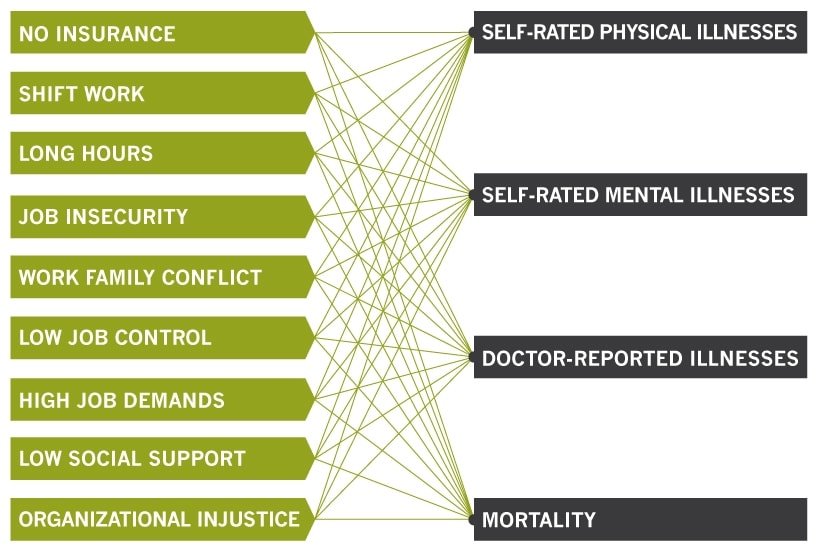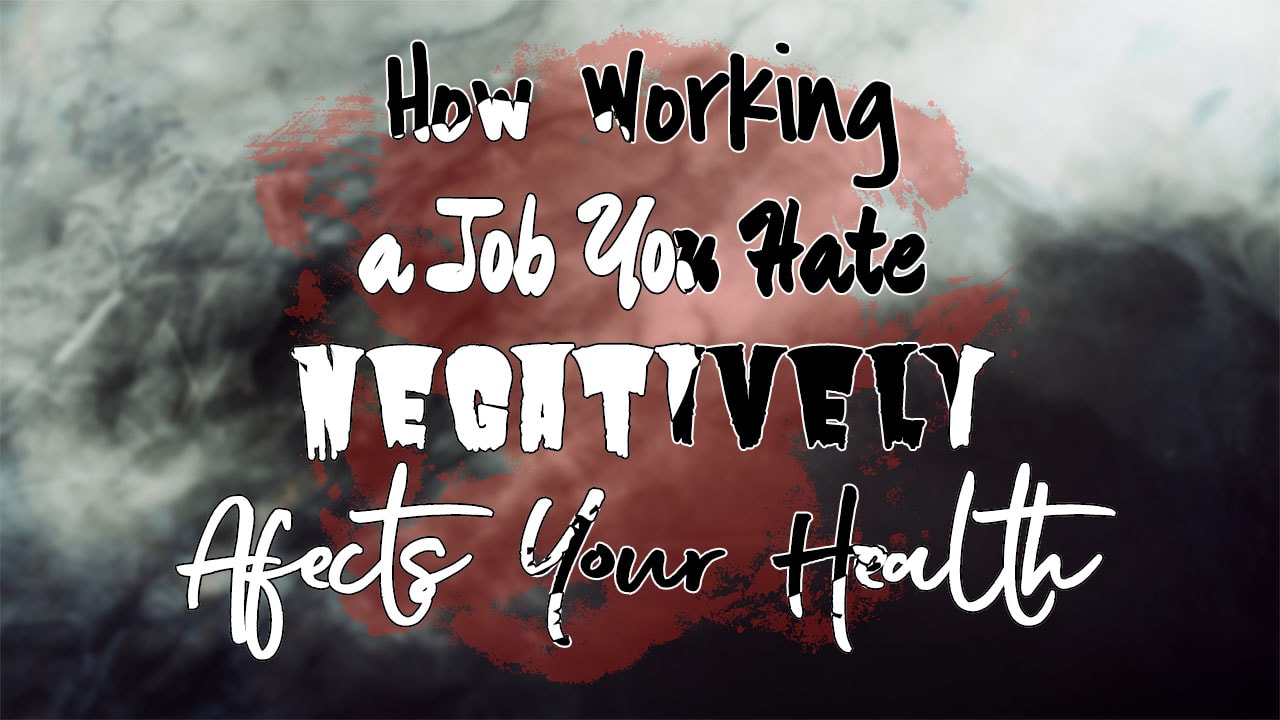If you’ve stayed in a job you hate for long enough, just like me, you already know how it negatively affects your health, both physical and mental.
Being constantly exhausted, having no mood to do anything else, getting sick more and more often, headaches and migraines which last for days, etc, are just a fraction of the negative effects that working a job I hated caused me.
Study after study confirms that being in a job you hate is indeed extremely damaging to your overall health.
For example, a BBC study has shown that work-related stress can be as bad as smoking, if not worse. And believe me that you can never not be stressed while working a job you absolutely loathe.
In an attempt to let you know exactly how working a job you hate negatively affects your physical and mental health, I did my research (a rather extensive one) and put together this article combining numerous studies along with my own personal experience.
What I found is astonishing… Read on to see for yourself.
Please note that this article might contain sponsored links.
Mental Effects of Working a Job You Hate
Most people spend at least HALF of their waking hours at work. This is actually a best-case scenario. It seems reasonable that spending half of your day, 5 days a week at best, somewhere you hate being, doing something you hate doing, being with people you hate being with, increases your chances of developing some kind of mental issue.
Call it stress, overthinking, mental exhaustion, low self-esteem, depression, etc, if continued unresolved for a significant amount of time, such emotions could start spilling over into your home and social life, eventually leading to emotional exhaustion and even burnout.
A study suggests that even being unemployed could be better for your mental health than working a job you hate and that transitioning from unemployment to working a job you hate can be way more detrimental to your mental health than just remaining unemployed. Whaaaat?
From now on I won’t fall silent the next time someone says to me “You should consider yourself lucky that you have a job… Other people can’t even find one!” – Those lucky ducks!
Anyway, let’s find out more about those mental issues that working a job you hate might cause.
1 • Increased Stress
Increased and prolonged stress is one of the first and most common mental issues that hating your job could give rise to. It is also one of the main predictors of other physical and mental health issues.
Stress is actually a normal response to danger, kind of like a survival mechanism destined to help humans cope better in case of danger, for example when got chased by lions, bears, or other predators.
However, no bear would chase a human for 8 hours a day, 5 days a week. Stress is not harmful in small and infrequent doses but being exposed to stress for that long or even more is unnatural and can have damaging effects on an individual’s overall health.
If you need to run from a lion, but you can’t because the lion is your job, or your boss, or inefficiencies around you, that can lead to a host of health issues. Physiologically, if you’re unhappy at work, that increases your stress levels. And when the body is stressed, it produces the hormone cortisol, which leads to the production of sugar, and gets stored in the body as fat, increasing the risk of diabetes. It also leads to insulin production, which can cause inflammation, and over time, these factors can result in more serious health issues like heart disease and stroke. – Dr. Hampton
This study supports that job-related stress plays an important role in several types of ongoing health and personal problems such as:
- regular headaches
- sleep disturbances
- difficulty concentrating
- Irritability and mood swings
- low morale
- poor relationships with family and friends
- cardiovascular disease
- musculoskeletal conditions
- and other physiological disorders
A study of 260 workers from a variety of industries, published in the journal Human Relations, found that employees who stayed at organizations out of either a feeling of obligation or a perceived lack of other job options were more likely than other employees to be experiencing such health problems.
If you asked me, the same goes for those who stay at a company for any reason other than liking what they do such as
- money
- peer approval
- society
- family pressure
- etc
On top of everything else, as time passes, jobs become more and more demanding and stressful as they require you to complete a ridiculous amount of tasks a lot faster and better than ever before.
Multitasking has become the norm in the job market nowadays. The sad part is that humans aren’t made to multitask but rather focus their energy and attention on one task at a time. The fact that our jobs are contrasting our own human nature also contributes to increased and prolonged stress levels.
Reducing stress is paramount to maintaining your physical, emotional, and mental well-being and nothing impedes that more than spending eight-plus hours, five days per week in an environment you despise. – Forbes
If you can’t seem to able to handle the stress and anxiety your job is causing you, then I suggest that you consult with BetterHelp.
2 • Sleep Issues
Increased stress levels could affect the overall quality and quantity of your sleep.
Thankfully, hating my job never affected my own sleep, mostly because it got me so exhausted that at the end of the day, I couldn’t even keep my eyes open.
However, several colleagues of mine, mostly those who were working the job for decades, reported having trouble falling asleep due to excessive overthinking about work or waking up at the middle of the night completely stressed out not being able to go to sleep again. Those instances were not one-time occurrences but almost daily ones.
Other colleagues also reported frequent nightmares about work-related issues such as clients threatening or supervisors yelling at them.
A study conducted in 2004 showed that working a job you hate doubles the risk of developing a sleep issue over a course of just one year.
In turn, having sleep issues can negatively affect many aspects of your work and personal life.
Sleep deprivation, poor quality sleep, as well as fragmented sleep are linked to lower performance, increased fatigue and sleepiness, less productivity, and a lack of alertness. They can also make us more sensitive to emotional and stressful stimuli and events, impair vision, cognitive functioning, judgment, short-term memory, motivation, and reaction time, and also lead to other serious health problems.
Lastly, having sleep troubles can easily result in further increased stress levels which could then result in more sleep troubles ending up in a total burnout.
Note: Most of what you’ve just read and most of what you are about to read in the next few sections are deduced by this study.
3 • Burnout
Burnout refers to a depletion of the individual’s energy resources, including emotional exhaustion, physical fatigue, and cognitive weariness, as a result of long-term exposure to work stress and/or sustained strain in daily life.
In short, during a burnout, even breathing feels like overexerting yourself.
A study conducted by Karolinska Institutet, Stockholm, Sweden, and Stockholm University, assumes that burnout is a result of
- long-term and elevated work stress
- high job strain
- demanding duties
- low levels of control at work
- preoccupation with thoughts of work during leisure time
- impaired sleep
To sum things up, hating your job leads to increased stress. Increased stress can give rise to sleep issues and sleep issues can in turn increase stress even more. At last, the combination of increased stress and sleep issues could eventually result in burnout.
4 • Excessive Worry
Excessive worry is another very common mental issue that hating your job could cause.
This happens as a result of being unable to leave your job behind (mentally) once you’ve physically left it.
Most of those who hate their job, including me, find that ruminating about it dominates most of their free time. To stop it is impossible.
Ruminating about work impairs your ability to successfully unwind and rest. Actually, while ruminating about work you are still as actively involved with it as you would be if you were actually there working.
Being stressed and worried not just 8 hours a day at work, but also 3-4 hours later at home is fucking exhausting.
Having difficulties to unwind or disengage from work during your free time, could negatively affect many aspects of your personal life as well as your sleep.
Summing up again:
- Rumination affects sleep
- Sleep problems = more stress
- More stress = more sleep problems
Being able to leave work behind and unwind seems to prevent the accumulation of all those negative effects.
However, disengaging from work as well as work-related thoughts while not at work is something impossible for those who hate their job.
Eventually, the work-life balance of those people gets seriously disturbed.
A poor work-life balance has been associated with a range of health problems such as cardiovascular disease, negative mood, saliva cortisol secretion, and sleep disturbance (great, more sleep issues). Most of those health problems might be caused by health-damaging behaviors which are pretty common among those who hate their job, such as
- lack of physical activity
- increased alcohol consumption
- poor dietary choices
- smoking
- taking drugs
- etc
It is becoming more and more apparent that employees need to be able to recover not only physically, but mentally, from the effects of their job in order to prevent long-term health consequences and end up leading a healthy work-life balance.
5 • Emotional Exhaustion
Several other studies have demonstrated that worrying about work during free time as well as high job demands, increased workload, low control over your job, lack of support at work, etc were all associated with emotional exhaustion.
Another study showed that working subjects who were able to detach from work during evenings reported more positive mood and less fatigue.
6 • Reduced Self-Esteem
Self-esteem is yet another aspect of oneself that gets afflicted for those who hate their job.
According to a study posted on the International Journal of Occupational Safety and Ergonomics, job satisfaction is directly correlated to an employee’s self-esteem and overall well-being.
Think about it. You spend so many of your waking hours at a place where you’re unhappy and doing things you don’t want to do. How could that not take a toll on the way you perceive yourself? – Forbes
Moreover, all that stress and worry that hating your job is causing you further diminish your self-esteem.
Some other work-related factors, which are usually tied with hating your job, that could negatively affect your self-esteem are
- Toxic co-workers
- Abusive supervisors
- Having no control over your job
- Huge amounts of workload
- etc
7 • Depression
After all this, is it so unnatural for someone to end up depressed? Not at all, several other studies suggest.
In fact, the consistent and elevated stress of showing up and being in a place you hate for 8 hours a day, five days a week can lead to an increase in anxiety and depression for both sexes.
Men’s Health actually confirms that people who reported greater levels of dissatisfaction with their jobs were also more likely to be diagnosed with emotional disorders like depression, anxiety, or bipolar disorder.
According to HRNews, the fact that you have to keep suppressing your frustration and dissatisfaction in front of your colleagues, clients, and boss, could dramatically worsen the situation.
Physical Effects of Working a Job You Hate
When the mind is unhealthy, the body will tend to follow its example.
To be more exact, a study conducted by the Ohio State University claims that the mental health problems caused by low job satisfaction may be precursors to future physical problems. For example, increased and prolonged stress and depression could lead to cardiovascular or other health problems that won’t show up until later on in life.
Hating your job could make you gain weight, weaken your immune system and even shorten your overall lifespan.
Let’s find out more.
1 • Weight Gain
Yup! Working a job you hate can contribute to gaining weight.
There is actually an eating disorder called “stress eating” whereas you are consuming food to make yourself feel better while being stressed, even if not hungry at all.
On top of that, HuffPost suggests that an unhappy work life robs you of the energy you need to exercise and make good dietary choices. When you get home after a long and frustrating day at work, you are less likely to spend time preparing a healthy meal for yourself. Instead, you will go for a quick and easy meal, which will often be a takeaway or an unhealthy microwave meal. At that point, exercising is, of course, out of the question.
The combination of low physical activity and poor food choices can lead to a whole host of problems further down the line, such as heart disease and diabetes. – HRNews
Another study found that workers increased their odds of being overweight or obese by 77% if they went home and crashed in front of the TV for a couple of hours. Those odds shot up to 150% if they vegged in front TV for four or more hours a day.
2 • Compromised Immune System
It’s no secret that remaining at a job you hate could take a huge toll on the efficiency of your immune system.
The common cold becomes much more common to you. Other minor illnesses also come and go week after week.
As per Men’s Health, those with low job satisfaction were more likely to suffer from 13 different health complications, including frequent colds and sinus problems, than those who enjoyed their jobs.
In fact, one study found that high job stress was associated with a lower white blood cell count, which can leave you more vulnerable to infections.
According to many other studies, hating your job is considered to be one of the main predictors for absenteeism, turnover rates, occurrences of the common cold, absences due to illness, and early retirement, as well as coronary heart disease (CHD) and mortality from CHD.
Lastly, studies show that job strain is associated with a 45% increased risk to develop Type 2 diabetes.
3 • Shorter Lifespan
 According to a research by two Stanford professors and a former Stanford doctoral student, now at Harvard Business School, workplace stress such as long hours, job insecurity and lack of work-life balance, contributes to at least 120,000 deaths each year and accounts for up to $190 billion in health care costs. :O
According to a research by two Stanford professors and a former Stanford doctoral student, now at Harvard Business School, workplace stress such as long hours, job insecurity and lack of work-life balance, contributes to at least 120,000 deaths each year and accounts for up to $190 billion in health care costs. :O
To be more exact, job insecurity increased the odds of reporting poor health by 50%, while long work hours increased mortality by almost 20%. Additionally, highly demanding jobs raised the odds of a physician-diagnosed illness by 35%.
My Personal Experience Working a Job I Hate
2016 was the first time I got hired to a job which I ended up hating to my bone.
Before I got the job, I was pretty sure that I wouldn’t like it but I was 26 at that time and I needed the money to be able to move out of my parents’ house and become independent.
How bad could a job be after all right? If only I knew the answer back then…
Anyway, it didn’t take me long to realize that the only positive aspects of my job were the steady salary and health insurance. Everything else is just awful.
The job’s nature is extremely stressful and demanding. There is a lot of micromanagement from my direct supervisor as well as my manager. The environment is as noisy as a busy street.
Our breaks are predetermined and very small, to begin with. We aren’t really allowed to get up from our offices for any other reason than going to the toiler.
We have to excessively multitask all day long. The goals set by our manager are impossible to reach due to the sheer volume of our workload. Our manager is being idler than a scarecrow and very narrow-minded.
The situation is generally going from bad to worse all the time.
Some obvious ways that this job affected me were
- Being more stressed than I have ever been in my life, both in terms of intensity and continuity
- Overthinking about work all day long
- I stopped physical exercise for a lot of months (for me this was definitely something to worry about as I was always overly active from a very young age up to the point that I got that job)
- No energy left to go out with my friends/family/girlfriend
- Getting sick way more easily and for longer periods of time (before getting that job I hadn’t been sick for about 3 years and maybe even more… At the time that I am writing this article, I am actually sick for the second time within two weeks. And it is still November…)
- Ditched my online business which I had started a couple of months before getting that job
- Feelings that I losing my good, old self
Thankfully, my job didn’t affect my diet that much. Of course, maybe that’s just because I actually enjoy cooking. Also, I used to follow a specific nutrition program for many years back when I was consistently working out so I believe that I have just get used to eating healthy.
My sleep wasn’t affected that much either. I sleep 7-8 hours daily. But again, this is because my job is draining all my energy and I simply can’t stay awake even if I wanted to. Most days I have difficulties waking up though and there have been weekends that I’ve slept for 12 hours straight.
For almost a year after being employed, my self-esteem was down the drain. However, now that I am working my way out of my crappy job I am feeling much more confident in myself.
Since I got employed I have very frequent headaches and migraines, sometimes going on for days. I never had headaches or migraines before.
I have also experienced some minor burnout phases while at this job but maybe that’s just because I am working on my online business on the side.
Anyway, the effects that working a job you hate has on your health might differ from person to person. However, one thing is certain… Working a job you hate could fuck your health up in many ways.
Key Takeaways
- Staying at a job you hate increases your stress levels. It also leads to excessive worry and overthinking
- Stress and worry could cause sleep issues
- Sleep issues could further increase your stress levels, your stress levels further affect your sleep, and so on and so on
- Consistent and increased stress combined with excessive worry can lead to burnout, emotional exhaustion, and even depression
- All those mental health issues can give rise to a plethora of physical symptoms such as weight gain, underperforming immune system, and even shorten your lifespan
- HATING YOUR JOB SUCKS!
Have you noticed if your job has negatively affected your mental and/or physical health?
How has it affected it?
Do you consider to start doing anything about it?
Let us know in the comments below.
If you have any questions or need any further help or guidance from me, please email me at harry@dearboss-iquit.com or drop me a PM on my Wealthy Affiliate Profile.
I will be thrilled to help you out.
Harry,
dearboss-iquit.com


